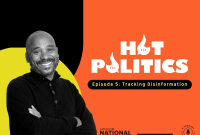What would be 2022’s word of the year? The announcement from the people behind the Merriam-Webster Dictionary came out — and the winner was “gaslighting,” which is defined as “the act or practice of grossly misleading someone, especially for one’s own advantage.”
Gaslighting is a type of brainwashing at the individual level, and psychological warfare on a societal level.
The intent is to manipulate someone or a group to doubt their own sense of reality and the truth, such as fundamental facts, knowledge, or even science. This conspiracy of deception and lies is an integral aspect of propaganda or, as popularly called today, misinformation and fake news.
Gaslighting is “a tactic commonly used by sociopaths and narcissists” and has been a favourite among autocratic figures such as Goebbels, Stalin, and Putin — and Donald Trump has been accused of gaslighting America. Corporations also use gaslighting by promoting junk science and other “alternative facts” to protect their vested interests.
The term “gaslighting” was adopted from a 1938 play called Gas Light (and later turned into the classic movie Gaslight) about a psychologically abusive husband trying to convince his wife to doubt her perception of reality. Gaslighting can be found in a wide variety of popular stories, ranging from the children’s fable Chicken Little to Animal Farm and Nineteen Eighty-Four by George Orwell to the film Rosemary’s Baby by Roman Polanski.
A more recent story on gaslighting is Don’t Look Up by Adam McKay. Reviewing this hit movie, NASA climate scientist Peter Kalmus related to the frustration of scientists (Mindy and Dibiasky) trying to warn of a pending danger:
“The scientists are essentially alone with this knowledge, ignored and gaslighted by society. The panic and desperation they feel mirror the panic and desperation that many climate scientists feel. In one scene, Mindy hyperventilates in a bathroom; in another, Dibiasky, on national TV, screams, ‘Are we not being clear? We’re all 100 per cent for sure gonna fucking die!’ I can relate. This is what it feels like to be a climate scientist today.”
The apathy concerning climate change is the result of gaslighting by Big Oil, as noted by economist Paul Krugman in an article titled “Enemy of the Planet”:
“But the fact is that whatever small chance there was of action to limit global warming became even smaller because ExxonMobil chose to protect its profits by trashing good science.”
And the history of science scholar Geoffrey Supran warned about such gaslighting:
“It's incredibly subtle, and frankly, a bit patronizing because it's gaslighting to insist that consumers are responsible, and then present the company as a trustworthy innovator who we should rely on to make things better.”
The U.S. government has investigated such devious tactics by industry. Gaslighting by Big Oil, for example, was documented at a recent congressional hearing:
“As we face more deadly, extreme weather around the globe, fossil fuel companies are reaping record profits and ramping up their misleading PR tactics to distract from their central role in fuelling the climate crisis… In the words of one company official, Big Oil is ‘gaslighting’ the public.”
And the IPCC provided similar warnings:
“Rhetoric and misinformation on climate change and the deliberate undermining of science have contributed to misperceptions of the scientific consensus, uncertainty, disregarded risk and urgency, and dissent.”
In the second episode of the podcast Hot Politics, investigative journalist Amy Westervelt laid out the consequences of these disinformation campaigns:
“So, I think there's been a real focus in the last 10, 15 years on climate science denial and the idea of injecting doubt into the science and, you know, just being able to create enough of a kernel of doubt in people's minds that they are unwilling to make big changes or to be inconvenienced in any way because they're not totally sure that this thing is happening.”
Gaslighting by the fossil fuel industry is also a problem in Canada, as reported by David Suzuki:
“The climate crisis is real and accelerating. It’s caused by burning coal, oil and gas and destroying ‘carbon sinks’ like forests and wetlands. Many solutions are available. We can’t continue to let the fossil fuel industry ‘gaslight’ us into thinking the reality is otherwise.”
A call has gone out by a group of medical and health advocates for the Canadian government to take action against the Canadian Gas Association:
“Advertising fossil fuels as clean while the world burns is as preposterous as using doctors to promote cigarettes. The federal government has both the tools and the responsibility to prevent fossil fuel gaslighting and protect the health of Canadians… We ask our government to act now to stem such disinformation and to get out the messages to protect our health and our planet,” writes the author of an op-ed about the practice.
Gaslighting was a ploy to turn the public and politicians against the warnings and recommendations of science. Why would corporations use gaslighting against science? The answer was simple: the science of climate change was a threat to their business.
Decades ago, a decision had to be made by the corporations: whether to accept or fight the science of climate change. Big Oil chose gaslighting as they initiated a massive public relations campaign to mislead the public and politicians about the science of climate change.
Gerald Kutney is a commentator in the news media and on social media on the politics of the climate crisis. He has authored the book Carbon Politics and the Failure of the Kyoto Protocol and is now working on CLIMATE BRAWL: Climate Denialism in American Politics.






Comments
Oddly, enough Gerald, when it comes to climate change and all the misinformation/gaslighting going on, we are in the "Don't Look Up" phase. Corporations are more concerned about short term profits and shareholders than the fact that we are all going to die as we kill off everything that sustains the ecosystem balance. We can already see weather patterns changes (floods, droughts, etc.) and animal, insects, and plant life crucial to our long-term survival disappearing.
It's unfortunate that the right politically is doing everything they can to discredit the left or science trying to save our planet.
The question is, how do we collectively counter the disinformation, gaslighting and overall inaction on Climate Change? How can we each individually be most effective? We should all be enraged that Big Oil and its financiers are stealing our future, our children and grandchildren's future.
Several times I've complained to the owners of billboard space and to radio and TV stations that advertising they are carrying does not meet the "truth" standard for Canadian advertising. I suspect I wasn't the only one to complain, since the ads disappeared within a week or 10 days.
So when you see disinformation displayed, call it out to those who are displaying it for the liars: it might help, and can't do any harm!
I also comment to neighbours about it. And to people in lineups of all sorts.